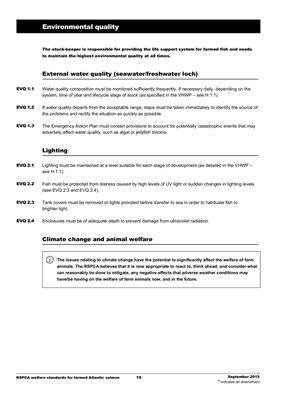
RSPCA welfare standards for farmed Atlantic salmon 19 September 2015
* indicates an amendment
Environmental quality
The stock-keeper is responsible for providing the life support system for farmed fish and needs
to maintain the highest environmental quality at all times.
External water quality (seawater/freshwater loch)
EVQ 1.1 Water quality composition must be monitored sufficiently frequently, if necessary daily, depending on the
system, time of year and lifecycle stage of stock (as specified in the VHWP - see H 1.1).
EVQ 1.2 If water quality departs from the acceptable range, steps must be taken immediately to identify the source of
the problems and rectify the situation as quickly as possible.
EVQ 1.3 The Emergency Action Plan must contain provisions to account for potentially catastrophic events that may
adversely affect water quality, such as algal or jellyfish blooms.
Lighting
EVQ 2.1 Lighting must be maintained at a level suitable for each stage of development (as detailed in the VHWP -
see H 1.1).
EVQ 2.2 Fish must be protected from distress caused by high levels of UV light or sudden changes in lighting levels
(see EVQ 2.3 and EVQ 2.4).
EVQ 2.3 Tank covers must be removed or lights provided before transfer to sea in order to habituate fish to
brighter light.
EVQ 2.4 Enclosures must be of adequate depth to prevent damage from ultraviolet radiation.
Climate change and animal welfare
The issues relating to climate change have the potential to significantly affect the welfare of farm
animals. The RSPCA believes that it is now appropriate to react to, think ahead, and consider what
can reasonably be done to mitigate, any negative effects that adverse weather conditions may
have/be having on the welfare of farm animals now, and in the future.
i